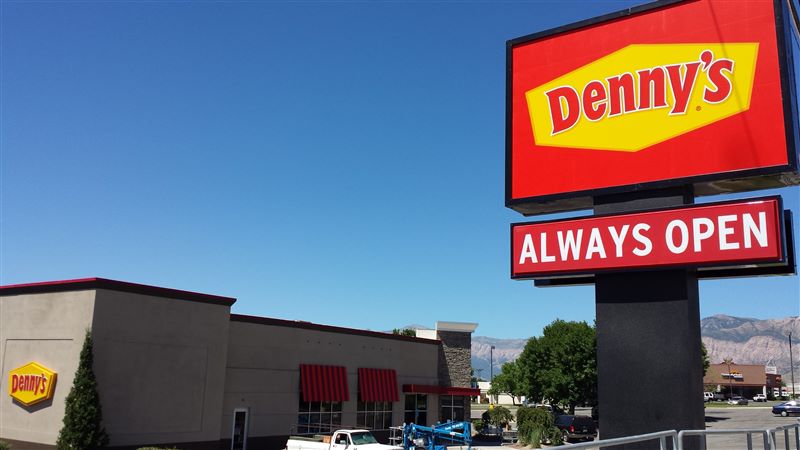
Hi! Today’s a re-run, originally from February 2018. (If you ever wonder how little of an editorial calendar I have, I apparently once ran a Christmas story in February.) I chose it today because it’s thematically attached to yesterday’s, and I figured that’d be fun. Enjoy! — Dan
The Problem with a No-Pancakes Christmas
When it’s three in the morning and you’re hungry in America, pancakes may be a good option. No, not because there’s something particularly 3 AM-ish about pancakes, but because of all the restaurants that are open at 3 AM, many serve pancakes. Take this list, for example: Perkins and IHOP both allow franchisees to stay open around the clock, and many do; for Denny’s and Waffle House, “always open” is the rule. In Denny’s case, that slogan is even on their signs.

But in the winter of 1998, Denny’s decided to do something they hadn’t done in recent memory — they closed down. Not just one Denny’s, closing due to inclement weather or for renovations or anything like that. All 1,221 of them, nationwide. The occasion: Christmas.
Denny’s, before Christmas Day, 1998, was, as advertised, always open. But that year — at the cost of an estimated $5 million in sales — the corporation decided to shut down for the day, giving its 60,000 or so employees a paid day off. Joe Herrera, then the marketing lead for Denny’s parent company, told the New York Times that “we just feel we spend 364 days a year taking care of other people’s families and for one day a year we want to take care of our own.” Certainly, it was a nice gesture (unless your family tradition was pancakes at Denny’s on Christmas morning, but let’s put that aside for now).
It also created a few jobs — accidentally.
Stores that are always open don’t need to ever lock their doors. And for a majority of Denny’s — approximately 700 of those 1,221 — they never bothered installing locks in the first place. But when the corporation decided to shut down for Christmas that year, someone needed to lock the doors for the first time ever. So, those 700 or so Denny’s needed to hire a locksmith.
Today, almost all Denny’s have a lock on the door as a result. But they don’t get to use them very often, if ever. Denny’s no longer closes for Christmas; in 2016, they issued a press release extolling their limited-time holiday menu available for those “looking for a delicious meal for the entire family” on December 25th.
Support Now I Know — Visit Today’s Sponsor!
How to Meal Prep in 30 Seconds
Huel Black Edition is the ultimate solution for anyone looking for complete nutrition, fast.
At just $2.50 per serving, you’ll get 40g of protein and 27 essential vitamins—all in just 30 seconds. Whether you’re rushing out the door or need a quick meal at home, Huel makes nutrition easy and affordable.
The cherry on top? New customers get a bundle of savings to kickstart their Huel journey. Use code HUELBE15 for 15% off your first order, plus a FREE t-shirt and shaker.
More About Denny’s
Today’s Bonus fact: Denny's wasn't founded by a Denny. The co-founders were two Los Angeles-area businessmen named Harold Butler and Richard Jezak. So who was Denny? No one. Butler and Jezak originally opened "Danny's Donuts" -- yes, Danny -- in 1953, using the name "Danny" solely to capitalize on the alliteration with their marquee product. (Here's what the original sign looked like.) In 1956, Butler (now running the business himself) pivoted to focus on coffee and breakfast options, and renamed the business "Danny's Coffee Shops." That caused some confusion because the Los Angeles area also had a "Coffee Dan's" at the time. Butler changed the "a" to an "e" and Danny's became Denny's.
From the Archives: This Restaurant Doesn’t Exist: Denny’s, virtually.
Support Now I Know!
Now I Know is supported by readers like you. Yes, you! Many of my readers donate a few dollars a month to help Now I Know grow and thrive. And in exchange, they get an ad-free version!
Interested in supporting Now I Know? Click here!
And thanks! — Dan


